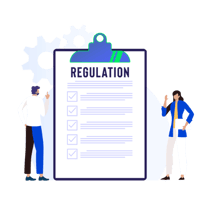A career in public service can be a rewarding path to follow, with many opportunities to be involved in unique types of work. While some choose to put their skills to work at the local or state levels of government, others decide to look for employment with the many departments of the federal government. Doing so, often requires bringing specific skills to the table. Still, applicants will be expected to complete other requirements, including passing the necessary background checks for government work.
These background check requirements are essential to understand when pursuing an interest in government jobs. Unlike the vetting process you might undergo for a regular job with a private business, the government has a much keener interest in protecting itself, the public, and the public's money from wrongdoing. Let's start by examining one of the most basic but essential questions.
What is a government background check?
As in the private sector, government agencies want to understand who applies to work with them. Selecting a suitable individual means evaluating their skills, talent, background, and trustworthiness. Especially in cases where someone might handle important government information, thorough consideration is necessary. “Government background checks” refer to the entire process, not just one element.
At their most basic, these checks are similar in nature and purpose to those used in the private sector. Federal background checks will examine your criminal record in extensive detail, accessing both federal criminal records through fingerprinting and by checking state and local records. You must often furnish an address history during application which the government uses to check your criminal record.
Credit checks are not usually involved in hiring in the public sector, but they may be a part of some security clearance investigations. Nonetheless, credit scores are generally not a significant barrier to the average job in the government. Other elements play a larger role in determining suitability—but what those elements are isn’t always the same.
Because the federal government is such a vast entity, what goes into specific federal employment background checks can vary significantly from one job to the next. Not only will the role determine whether a candidate needs a security clearance. Also, it will influence which convictions a hiring manager may view as disqualifying. What counts as disqualifying can undeniably vary significantly from job to job within the federal government—so it is important always to read the job postings carefully. The government always discloses what positions require in terms of vetting.
According to the Office of Personnel Management, which processes most background checks for federal jobs, each department or agency decides whether a person is suitable for a position. In other words, a conviction that might lead to a disqualification for one job—such as a DUI—might not be a deal-breaker for a different federal agency. The nature of the job in question will also significantly impact what factors into the vetting process. There are rarely blanket bans on candidates with specific records; instead, federal law requires an individualized assessment of applicants.
Does Everyone Seeking a Government Job Need a Background Check?
Yes, every person hired for a job with the federal government must submit to the federal employment background check process. Again, what that process includes depends on the specific job, particularly the access level to sensitive or confidential information. Positions deemed responsible for the effective stewardship of the public trust also may have more extensive vetting involved. All federal employment background checks are designed to make sure each person hired to a government job is “reliable, trustworthy, of good conduct and character, and loyal to the United States.”
The Federal Fair Chance Act
In 2019, Congress passed the Fair Chance to Compete for Jobs Act. Also known as the “federal ban the box law,” this new rule established restrictions similar to those in many states today. Under this law, government agencies will not make criminal history inquiries until an applicant's conditional job offer is extended. Only once there’s an offer on the table—and the candidate agrees to move forward—does the formal vetting process begin in earnest.
Note that there are exceptions, however. If the U.S. Code mandates that certain positions continually undergo criminal background checks, vetting may commence before making a job offer. Federal law enforcement applicants (e.g., for the United States Marshals or the United States Capitol Police) are also exempt and must submit to background checks immediately. Positions requiring handling classified information or security clearance are not subject to the federal Fair Chance Act.
What Are Security Clearances?
If a position involves access to sensitive or confidential information, the person applying must obtain a government security clearance. All security clearances require additional checks that may include, at the minimum, interviews with spouses, neighbors, friends, family, and work colleagues.
There are three levels of security clearance: Confidential, Secret, and Top Secret. These are separate determinations from public trust clearances, which happen concurrently with the security clearance process. The depth, length, and details of a government background check will vary depending on the level of security clearance an applicant needs and the job requirements. Someone who needs a Top Secret clearance can expect a much more rigorous and time-consuming process than someone who only needs a Confidential clearance.
What’s Involved in Earning a Security Clearance?
The default background investigation for Confidential and Secret security clearances is a “Tier 3” investigation. The central part of this investigation is a National Agency Check (NAC), which is standard for all security clearance background checks. It considers results from previous government investigations and the FBI fingerprint criminal history database. Other types of federal agency background checks may be part of the NAC, depending on the nature of the position.
Other checks for the Tier 3 investigation include:
- Selective service registration verifications for male candidates
- Employment history checks
- Residence history checks
- Educational verifications
- Credit history checks
- Local law enforcement background checks anywhere the candidate ever lived, worked, or attended school.
There is usually a five-year lookback period involved for Confidential and Secret clearances.
Candidates requiring Top Secret security clearances must go through “Tier 5” investigations, the most rigorous used by the government. These investigations incorporate all the elements of a Tier 3 investigation alongside the Single Scope Background Investigation, which has a ten-year lookback period into many aspects of a candidate’s personal and professional life.
Top Secret clearance holders are also subject to the Continuous Evaluation (CE) process. CE re-checks government workers randomly when they are in between investigations. These automated checks investigate everything from criminal history to financial information (liens, bankruptcies, and the like) and credit checks. CE screenings may also include checks of employees’ social media profiles if those profiles are publicly accessible.
Do You Need More Than One Federal Government Background Check?
Most applicants will only require a background check during the initial hiring period for basic positions and those that don’t involve high levels of public trust or clearance. As mentioned, Top Secret clearance holders are subject to random re-examination—but clearances also expire. Once you earn a clearance, you must periodically revisit the process so the government may determine if the clearance is still appropriate.
For instance, a Confidential security clearance lasts for 15 years. Secret security clearances are valid for 10 years. A Top Secret clearance, on the other hand, is only suitable for five years, after which the background check process must start over. Applicants should understand that their conduct and behavior will be under the microscope repeatedly for such high-level clearances.
Preparing to Apply for Federal Employment
From determining whether you can hold a position of public trust to examining your criminal records to even interviews and questionnaires—it’s easy to see that the federal employment application process is more complex than you’ll find in almost any private sector job. Although the process can be complex, individuals can make the effort simpler by being well-prepared.
One of the most important things you can do when applying for a federal job is to be as truthful and honest as possible in all your responses. You will be asked to answer questions about past jobs, addresses, and more—often with accompanying dates. The more accurate and thorough you can be, the better.
It’s a good idea to explore your own criminal history background check before applying for a federal job (or any job, for that matter). That way, you can better understand what employers might see when they screen you. Visit our “Personal” products page today to run your self-background check to better understand and prepare to apply for federal employment.
Get monthly updates on Government

About Michael Klazema The author
Michael Klazema is the lead author and editor for Dallas-based backgroundchecks.com with a focus on human resource and employment screening developments



